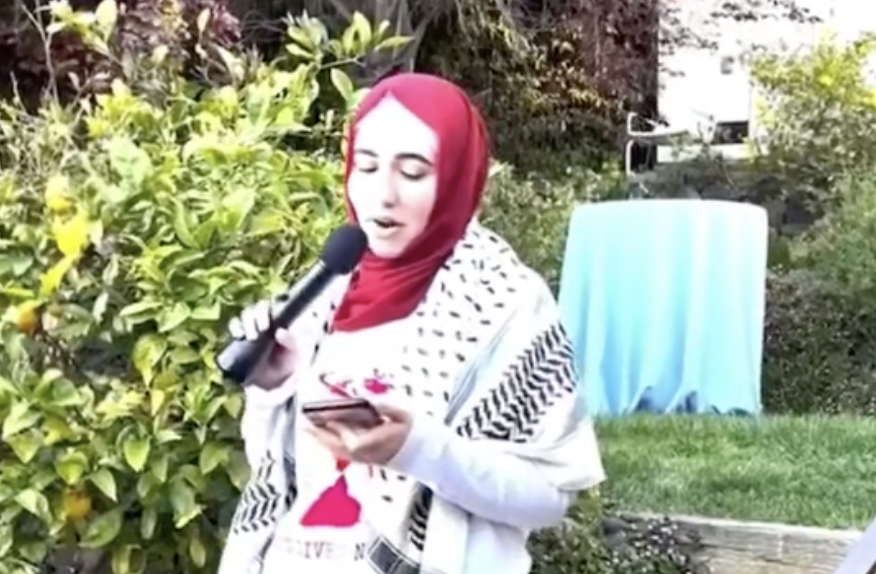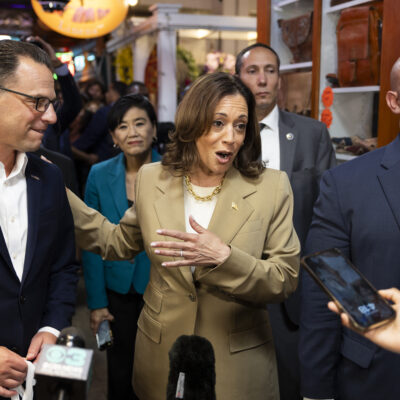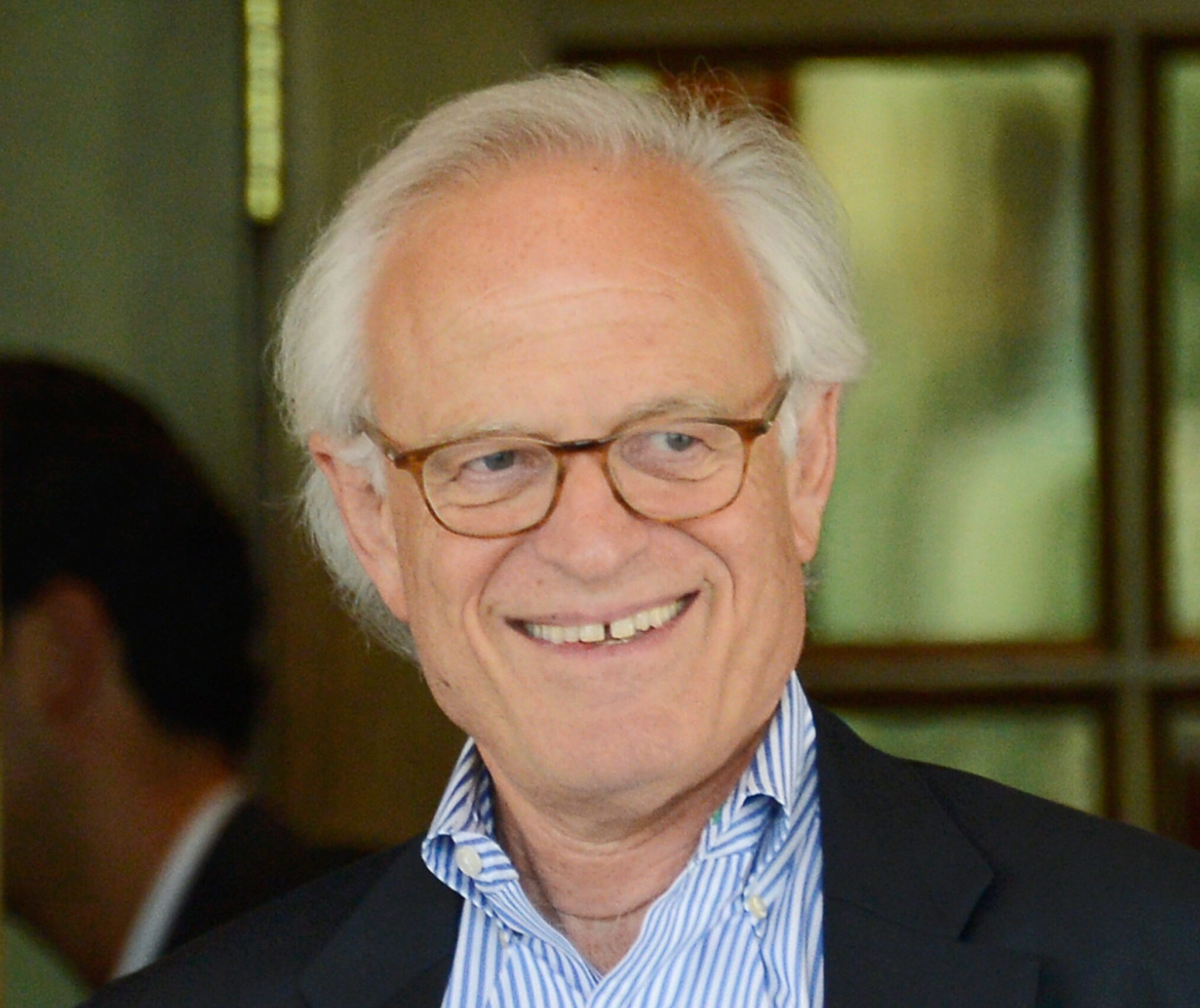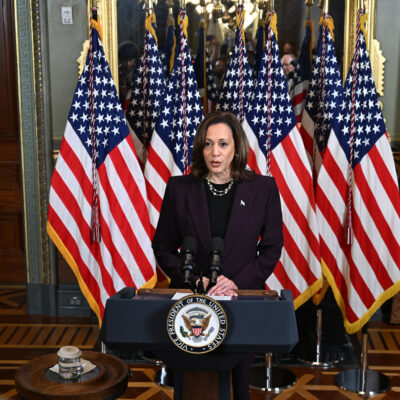UC Berkeley condemns student antisemitic threats, school says it can’t disclose if it’s disciplining offenders
School president acknowledges that anti-Israel students targeted law school dean’s home reception because he’s Jewish

screenshot
Malak Afaneh gives a speech at the home of the University of California, Berkeley law school's Dean Erwin Chemerinsky
Days after the posting of a video that showed the dean of the University of California, Berkeley’s law school and his wife clashing with anti-Israel students at their home during what was meant to be a congratulatory graduation dinner, the university’s president condemned the incident as “antisemitic, threatening and not [a reflection of] the values of this university.”
After the incident, in which a student grabbed a microphone to give an unauthorized speech about the plight of Palestinians at the home of law school Dean Erwin Chemerinsky, some students and local Jewish leaders are left wondering whether UC Berkeley will take disciplinary action, and are calling out the school’s leadership for a lack of transparency.
“When you don’t take [immediate] action, people have permission to continue escalating their tactics,” Tyler Gregory, CEO of the Bay Area Jewish Community Relations Council, told Jewish Insider.
“What we are seeing is inaction on the administration’s part, and we know whenever a student is investigated, it goes into a black box and we don’t learn what happened,” Gregory said. “Are they going to be reprimanded or expelled? That information is not public so there’s no transparency for Jewish students, faculty and community members and that also looks like complete inaction in terms of holding someone accountable.”
The incident occurred on Tuesday evening, when several third-year law students were invited to attend one of three dinners celebrating their upcoming graduation at the Oakland home of Chemerinsky and his wife, law school professor Catherine Fisk.
Held in the couple’s garden, the first dinner was disrupted when Malak Afaneh, a Palestinian American law student at the school who serves as co-president of Berkeley Law Students for Justice in Palestine, grabbed a microphone and started giving a speech about Gazans who have been killed amid Israel’s war with Hamas. As Chemerinsky and Fisk pleaded with Afaneh to leave their backyard, and eventually threatened to call the police, she continued calling for the university to divest from corporations with ties to Israel.
Video footage shows Afaneh stating that it was her First Amendment right to speak at the dinner, to which Chemerinsky, a prominent constitutional rights lawyer and ardent defender of free speech, said, “This is my house. The First Amendment doesn’t apply.” Eventually, after much back and forth, Afaneh and a group of about 10 students left the property.
In a statement about the incident, Chemerinsky said that he was writing “with profound sadness” after the dinner was “disrupted and disturbed” by the student who “stood up with a microphone, stood on the top step in the yard, and began a speech, including about the plight of the Palestinians.”
“Any student who disrupts will be reported to student conduct and a violation of the student conduct code is reported to the [state] Bar,” he added, stating that he planned to go through with the other scheduled dinners. The dinners are an annual tradition for the couple, but security was present at the remaining two events, on Wednesday and Thursday, for the first time, he said in a statement.
“I am deeply saddened by these events and take solace that it is just a small number of our students who would behave in such a clearly inappropriate manner,” the law school dean wrote.
Prior to the dinner, Chemerinsky said there was an “awful poster” spread around social media and school bulletin boards in the law school building that portrayed him holding “a bloody knife and fork, with the words in large letters, ‘No dinner with Zionist Chem while Gaza starves.’”
“I never thought I would see such blatant antisemitism, with an image that invokes the horrible antisemitic trope of blood libel and that attacks me for no apparent reason other than I am Jewish,” Chemerinsky wrote in the statement. “Although many complained to me about the posters and how it deeply offended them, I felt that though deeply offensive, they were speech protected by the First Amendment. But I was upset that those in our community had to see this disturbing, antisemitic poster around the law school.”
Chemerinsky wrote in an Oct. 29 Los Angeles Times op-ed that he has heard on campus “several times that I have been called ‘part of a Zionist conspiracy,’ which echoes antisemitic tropes that have been expressed for centuries,” adding that at 70 years old, “nothing has prepared me for the antisemitism I see on college campuses now.”
UC President Michael Drake said in a statement on Thursday, “The individuals that targeted this event did so simply because it was hosted by a dean who is Jewish. These actions were antisemitic, threatening, and do not reflect the values of this university.”
The language differed from university administrators’ condemnation in February, when an antisemitic mob forced the evacuation of Jewish students from an event where an Israel Defense Forces reservist was speaking. At the time, official statements avoided mentioning “antisemitism,” even while three Jewish students were injured and a junior was reportedly called a “dirty Jew” and a Nazi.
“It’s a great step in the right direction, to address it as what it is,” Daniel Conway, a fourth-year Berkeley student studying environmental economics and policy, told JI.
“But the larger problem,” continued Conway, who serves as president of Bears for Israel and is a founder of the campus’ chapter of Alpha Epsilon Pi, “is when you address antisemitism and then let it continue, and don’t take action. This is a critical component, to address antisemitism for what it is. Now it’s up to the university to decide whether they will tolerate antisemitism on campus.”
Conway described the climate on Berkeley’s campus for Jewish students as “uncomfortable,” adding that the lack of a crackdown from administration makes it “a lot more difficult to be open about my identity… it’s a climate that has been able to manifest itself just because of the lack of addressing antisemitism.”
In a statement to JI, Dan Mogulof, Berkeley’s assistant vice chancellor for executive communications, did not disclose whether disciplinary action will be taken. “We are prohibited by federal law (FERPA) from offering any comment about student conduct or discipline that can be connected to a particular student or students,” he said.
Ethan Katz, an associate professor of history and Jewish studies and the director of Berkeley’s Center for Jewish Studies, added that “confidentiality should not lead to any assumptions or conclusions as to whether the administration is taking any disciplinary action.”
Katz, who heads Berkeley’s antisemitism task force, called the incident at Chemerinsky’s home “just totally unacceptable.”
Six months after anti-Israel activity began to dominate many college campuses in the wake of the Oct. 7 Hamas attacks — with minimal action taken by college presidents to quell rising levels of antisemitism — administrators at schools such as Pomona, Columbia and Vanderbilt have taken a harder line in recent weeks. As a result, Jewish leaders are wondering whether these three schools’ tougher responses could represent the leading edge of a trend that takes root across the country.
But JCRC’s Gregory said that in the Bay Area, the potential trend is nowhere to be seen, emphasizing that no local schools have addressed antisemitism in an appropriate fashion.
“We need some stronger signals, if the administration is taking concrete steps. We also still don’t know what happened from the [February] riot,” Gregory said.
In November, the Louis D. Brandeis Center for Human Rights Under Law filed a complaint on behalf of Jewish students in the U.S. District Court for the Northern District of California, alleging that the Berkeley campus is a “hotbed of anti-Jewish hostility and harassment.” The lawsuit named Drake, as well as the UC Regents, UC Berkeley Chancellor Carol Christ and other officials as defendants. It claimed that since Hamas’ Oct. 7 terrorist attack in Israel, antisemitism has been exacerbated at the school — citing several on-campus incidents of intimidation, harassment and physical violence against Jewish students.
The complaint, a copy of which was obtained by JI, detailed several incidents, including a pro-Palestinian rally following Oct. 7 in which a Jewish undergraduate who was draped in an Israeli flag was attacked by two protesters who struck him in the head with a metal water bottle.
UCB professor Steven Davidoff Solomon, who teaches an undergraduate class on antisemitism in the law, told JI at the time that he’s “not sure why a Jewish student would come to [Berkeley] law school.”
Conway added that the lack of transparency after the Tuesday night dinner is “not surprising.”
“We’ve seen from previous events this semester that students break policy, and sometimes the law, and even then the university is extremely slow to respond,” he continued. “Every time something like this happens we hope this is the time that something will come from it.”









